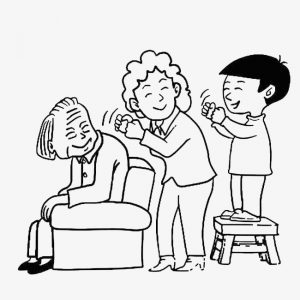Filial piety, which is called ‘hyodo’ in Korean, is defined as supporting and serving one's parents and is a natural duty of a person. Filial piety is a mutual relationship between parents and their children. In Korea, however, under the influence of Confucianism, more emphasis is placed on a child’s filial duties toward their parents. Grandchildren are also expected to have filial piety and respect for their grandparents. ‘Hyodo’ is a natural emotion and a way of fulfilling filial obligations at the same time. Children must repay their parents with filial piety in return for giving them life and raising them, although this is not a transactional thing. Parents give their children the three “gracious favors” ('eunhye') of birth, upbringing, and wealth while children are expected to carry on the family line, support their parents, and observe memorial rites after their death. The things inherited or passed down from parents including wealth, social status and human relations are at the core of the institutionalization of filial piety. This moral standard is a large part of Korean culture and can be seen in many Korean dramas and movies. In Korea, it is not uncommon to see multi-generational families living under one roof where the children support and take care of their parents and/or grandparents.


Comments
Hey Grace this was really interesting. I love when I can draw similarities between my culture and others. I've found that a lot of my friends from the Eastern Hemisphere share similar values about family and duty. There are times where I wish it wasn't so rigid but I am always thankful to have the comfort of a very interconnected family. I also look forward to putting off paying rent for as long as possible. Shout out to piety!